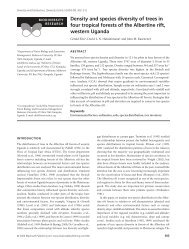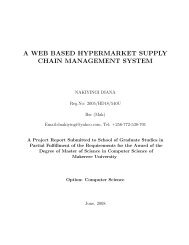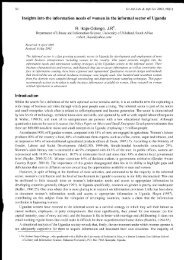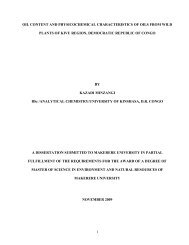THE UNIVERSITY OF LEIPZIG
THE UNIVERSITY OF LEIPZIG
THE UNIVERSITY OF LEIPZIG
Create successful ePaper yourself
Turn your PDF publications into a flip-book with our unique Google optimized e-Paper software.
land, and water sources. 331 Compliance, reinforced by an authority system, is a necessary<br />
pre-condition for the viability of any resource regime.<br />
A common resource regime would not work without the requisite authority system that makes<br />
it certain that rights and duties are adhered to. 332 The same requirements exist for state or<br />
public goods such as biodiversity. Without authority there can be no property! When the<br />
authority system breaks down, the coherent management of natural resource use collapse.<br />
Under these circumstances, any resource regime, whether private, common, or state,<br />
degenerates into open access. 333 Therefore putting all this together we understand that a<br />
reasonable degree of authority and organization among resource using communities is not an<br />
option, it is a must. The big question that arises is: with this kind of structure put in place and<br />
supported by revamped institutions, can we see a move to restoration rather than continued<br />
degeneration of natural resource regimes in Kenya?<br />
Mearns points out that the central role of institutions is in regulating patterns of governance.<br />
He makes the evaluation in specific regard to the behaviour between individual groups in<br />
society in mediating environment-society relationships. 334 He grounds his argument in the<br />
extended form of entitlements analysis, looking at how differently positioned social actors<br />
command environmental goods and services. 335 But our concerns here are; how do different<br />
social actors view natural resource regime changes at different times? How does control of<br />
access by these actors transform the natural resource governance?<br />
Sen uses the term entitlements not to mean what people should have but the range of<br />
possibilities that people can have. In other words to him entitlements represent the set of<br />
alternative commodity bundles that a person can command in society using the totality of<br />
rights and opportunities he or she faces. 336 Sen’s analysis seems to look at how individuals<br />
gain from different resource endowments to improve their well being and social standing.<br />
However, Melissa reacts differently to Sen’s analysis. He informs that this is a rather<br />
descriptive approach and cannot easily show us how such people can or cannot survive under<br />
a given institutional setting. 337 But then Sen goes ahead to mention that entitlements can<br />
enhance people’s capabilities, which explains what people, can do with their entitlements. He<br />
illustrates this through examples like, command over fuel resources derived from rights over<br />
331<br />
Behnke, R H. 1984. Fenced and Open-Range Ranching: The Commercialization of Pastoral Land and<br />
Livestock in Africa', In Livestock Development in Sub-Saharan Africa, edited by Simpson, J.R. and P.<br />
Evangelou, 261-284. Boulder: Westview Press.<br />
332<br />
Baden, J. 1977. A Primer for the Management of Common Pool Resources', In Managing the Commons,<br />
edited by H.Garrett and J, Baden, 137-146. San Francisco: W.H. Freeman.<br />
333<br />
Andelson, R. V. 1991. Commons Without Tragedy: The Congruence of Garrett Hardin and Henry George', In<br />
Commons Without Tragedy: The Social Ecology of Land Tenure and Democracy, edited by R.V, Andelson,<br />
613-615. London: Centre for Incentive Taxation.<br />
334<br />
Mearns, R. 1995. Environmental Entitlements towards empowerment for sustainable development. In<br />
Towards Sustainable development edited by Singh, N and V.Titi, 37-53. London: Zed Books<br />
335<br />
Sen, A. 1984. Rights and Capabilities. In Sen, A. Resources, Values and Development. Oxford: Blackwell.<br />
336<br />
Sen, A. 1999. Development as Freedom. New York: Anchor Books.<br />
337<br />
Melissa, L, R. Mearns, and I. Scoons. 1999. Environmental Entitlements: Dynamics in Community Based<br />
Natural Resource Management. Brighton: World Development 27:225-347.<br />
66






